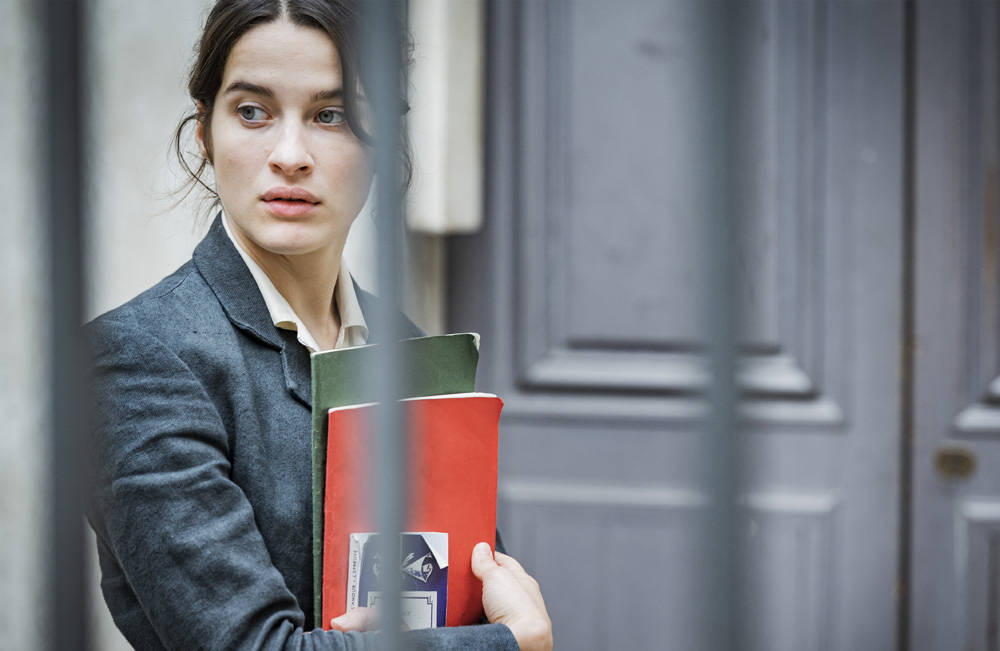Irene (Rebecca Marder) lives each day like her last, even if she is blissfully unaware that tomorrow isn’t promised in “A Radiant Girl.” Set during the summer of 1942 when the Nazi occupation was sweeping across Europe, the 19-year-old can still live a relatively carefree life in Paris where she plans to pursue a career in the theater, putting all her energy into the latest production at the local conservatory. Her father Andre (André Marcon) is more than happy that she is none the wiser, hoping to keep her and her older brother Igor (Anthony Bajon) from having to experience the increasing indignities that he is in his circles as a Jew and the family matriarch Marceline (Francoise Widhoff) forbids the subject from even being brought up at the dinner table, despite the fact that their neighbors’ unusual behavior requires some explanation.
The fact that a present-day audience knows that the unspeakable has happened but Irene does not is used to devastating effect in Sandrine Kiberlain’s directorial debut where the cocoon of youth is worth protecting at all costs. Even if Irene didn’t seem like a threat to burst off the screen, so exuberant in all her pursuits that she races around the neighborhood as if she’s constantly floating on a cloud, Kiberlain fills the screen with sprightly colors and occasionally anachronistic music cues to dislodge the story from its period trappings, demonstrating how all-consuming passion can become at that age even if the rest of the world is on fire. The bold choices may be surprising as far as the history it’s recounting, but less so for those familiar with Kiberlain as a leading light of French cinema as as an actress, a favorite of auteurs such as Stephane Brize, Benoit Jacquot and Martin Provost who she now comfortably takes a place alongside in having a distinctive vision.
Startlingly prescient, “A Radiant Girl” began racing into hearts of those at Cannes Critics Week in 2021 en route to a celebrated festival run that now culminates in a release this week in US theaters and after making the trip to New York where they will be on hand for post-screening Q & As at the Quad Cinema this weekend, Kiberlain and Marder generously spared a few minutes to talk via a translator about their collaboration, taking on such a dark period in history and making it undeniably resonant today.
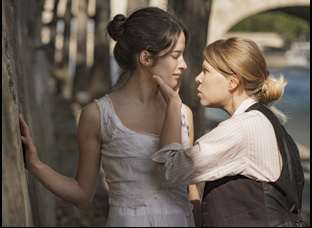
Sandrine Kiberlain: It was something I thought about doing for a long time, but it was indeed the subject of the film. When you start out as an actor, you really focus in very much on yourself and with the passage of time, I began to focus in also on what other people were doing on the set, the people behind the camera and I really wanted to tell a story from my particular point of view, so this was what really gave me the conviction and the motivation to do this and to do it behind the camera crew rather than as an actress.
Rebecca Marder: What made me so lucky and happy was that as an actress directing, [Sandrine] has so much empathy, and she knows what makes you weak or strong as an actor. She lifted me up by trusting me and she made me confident about what I could do. Being directed by someone who knows so well about acting and with so much empathy, even actors who would come and spend one day on the shoot, they all had a name, their character had a name because Sandrine knows what it is to be a small part in a movie and how you make people [invested in] your project, so she really made everyone really enthusiastic about this movie.
Beyond that, what excited you about this, Rebecca?
Rebecca Marder: The story, of course, made me excited, and the fact that I could play a young girl that was not so far from me [right now] — this whole period of passing auditions to get into school and doing theater, everything felt so close to me, even if it was happening in the ’40s. I feel that’s timeless — the insolence of youth and believing in what you wanna do in your passion, art, and love, even if the world is falling apart. I felt really close to the character, and I was so excited to work with Sandrine and all my partners [on the film] because they are great actors.
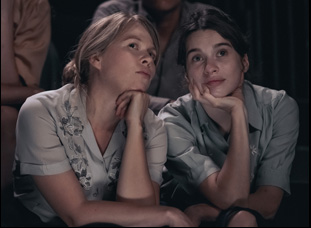
Sandrine Kiberlain: It’s true that having that aspect of modernity was something that was part of it from the very beginning, and I didn’t want the film to be a historical reconstruction. I wanted the character of Irene to really be a character for all time — past, present and future — yet at the same time, I wanted the scenes to be truthful to the time period in which the film takes place. I did this through elements [such as] the set design and the decor, which is very sober, and in the writing because there are words used then that we’re not using now. And love stories are love stories, but even the way they’re expressed sometimes is different, so I wanted the writing to reflect that.
But to give you an example with the music, the Charles Trenet song “I Wish You Love” is a song that she would have known because it was of her time period, but other music that I used was not chosen for its modernity or its specific temporality but because of the emotions that the audience feels. In the love scene where they’re in the stairwell, where the lights are on the timer and they’re going on and off, I wanted that kind of music to have that groundswell of rhythm and emotion that I know I felt in seeing movies and probably a lot of the audience has as well, so I allowed myself to have this mix of authentic with the period modern and also this timeless music that expresses emotion. For me, the best compliment that I can receive is when young people come up to me and they say, I recognize myself in the character of Irene. I can identify with her. And I think it’s important because in the film we’re speaking about issues that are still contemporary today — anti-Semitism, hatred, injustice. It’s not just a film about the Holocaust, but it’s something that’s about all of those things that are still very much present now.
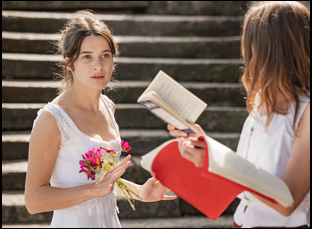
Sandrine Kiberlain: Right from the beginning, the idea was that she was never stopping, so as you see, she runs out, she slams the door closed, she runs down the stairs. And it was important because that constant movement would reflect how she was seeing things around her. That was what I wanted the film to do, to have the viewers see what she’s seeing, but in order to highlight that, I contrasted it with the kind of filming we did with the people who were in the older generation where the people are very much more posed. They’re not in that frenetic movement that characterizes the youthful enthusiasm of the character of Irene.
I also wanted to make a point that, despite the fact that she is in this constant movement,her character isn’t to be considered somebody scatterbrained or on a more frivolous level, because she’s not that type of character. We see that because we know what she knows and there are moments when this movement and this lightness are actually not present — for example, in the scenes where she faints, we know that within her, she knows something [deep down is wrong], so the character is by no means meant to be this flighty, scatterbrained young person.
Rebecca Marder: [Sandrine and I] didn’t need too many words during the shooting and she understood that I understood Irene and we talked about the difference about knowing and showing, like saying things without saying them. And I had an advantage [playing this character] from 60 years in the future, so I knew what the historical circumstances are whereas the character of Irene is living them, so what was important for me when I was playing her was to forget what I know and to portray the character through what she herself would have known at that time. Also, what was really unique about this shooting experience was that Sandrine would always stay really close to the action and to the actors. She would be behind her little screen and I could feel her breathing or laughing or crying during the scene while I was acting, so we didn’t exchange so many words, but we would understand in what emotion the character was for every scene. Living in the present [moment] was really the key.
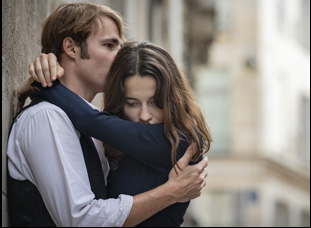
Sandrine Kiberlain: I’m thinking about it because you asked me the question, but I generally don’t really rethink those kinds of things. What has been fortunate for me is that I’ve had the opportunity to play a lot of different kinds of characters and work with a number of really great directors, and not to be falsely modest here, but I also think it has something to do with the choices that I made in the films because I wanted to do comedies, but I wanted to do drama as well, so perhaps that [variety is] reflected. As someone who just loves film, I’m very glad to have had the opportunity to have directed at least one film in my career so that I know what it’s like to be on the other side of the camera. What was really rewarding [with “A Radiant Girl”] was that I love young people and working with Rebecca, I really enjoyed the trust that she put in me, and in turn, I felt like I was transmitting something that I knew from my experience to her and with younger people, everything is something new, whether it’s in cinema, in life, in love. That’s something that’s very appealing to me.
“A Radiant Girl” opens on February 17th in New York at the Quad Cinema, Los Angeles at the Monica Film Center and Montreal at the Cinema Du Musee.




